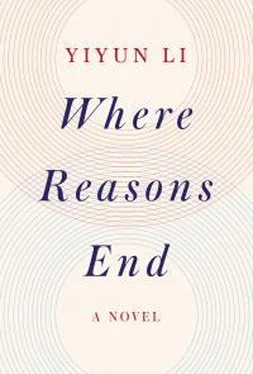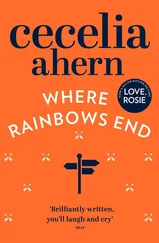What you call quicksand, I said, is our reality.
Yours and mine?
Yes, our genes.
Why don’t we get to live like other people, on flat and solid earth before it was discovered to be round?
Other people live on other kinds of quicksand, I said.
Really?
I don’t know, but I like to imagine that is the case.
I don’t think so, he said. What’s underneath the quicksand?
What’s underneath? I said. I don’t know.
We don’t fall into an abyss for no reason, he said.
What if, I thought, we keep trying? What if an abyss can be made into a natural habitat? What if we accept suffering as we do our hair or eye colors? What if, having lived through a dark and bleak time, a parent can convince a child that what we need is not a light that will lead us somewhere, but the resolution to be nowhere, even if it’s ever and forever.
What then? he asked. That I would make do with my imperfections ever and forever?
No one is perfect, I said.
That’s an old line, he said. It means nothing to me.
Life is imperfect, but it does mean something, no?
Yes, it’s a consolation prize, he said. But I don’t live for consolation prizes, Mother dear.
15
Never Twice
It’s that time of the year, I said. I’m thinking about my New Year’s resolutions.
Do you remember last year’s resolutions, or the year before last’s? Nikolai said.
If I go back and look for them in my journal, I said.
Ha.
But I’m still making a list.
Let me see, he said. You’re going to bake a lot of cakes.
How do you know? I said.
Because I know how unimaginative you can be, he said. If you said horseback riding or beer-brewing or beekeeping or stargazing, I might not have guessed.
It doesn’t bother you, my taking up baking?
What do you think? Baking is my territory, he said. Cooking is yours.
But you are learning to cook, too, I said. I was keenly aware that we were both using present tense.
Baking is my meditation, he said.
I know, I said. He used to bake when he was agitated.
What is baking to you? You can’t meditate my meditation, he said.
Remembrance, I thought.
Baking doesn’t allow revision, don’t forget, he said.
Knitting does, I said.
You’re going to knit too?
When I was a small child, I had been trained to knit every summer, with old yarn that had already lost its elasticity. I had hated the rusty-red stringy yarn, scratchy on my sweating arms. I had hated that my mother would examine my work at the end of the day. And I had hated, most of all, that after the ball of yarn was used up I had to unravel it and start all over again. But these things I had never told him. The first time he discovered that I could knit he had been impressed.
Only because you don’t look like a knitter at all, he said.
Why not?
We knitters find joy and comfort in repetition, he said. Can you write the same sentence over and over?
What if life requires a certain amount of repetition, I said. I can’t write the same sentence or story over and over, but maybe I can use knitting to meet the requirement.
At least you’re better at knitting than baking, he said. It’s possible for you to knit and achieve something even if you can’t, like any self-help book would advise you, enjoy the process.
Thank you for your rare praise.
Remember the octopus you knitted? he asked.
I had almost forgotten. In middle school, for Secret Santa, Nikolai had asked me to knit an octopus. Two days, he had said. No way, I had said. Yes way, he had insisted. By the end of the two days I had given him an octopus, which had an opal-white body, light-blue tentacles, and beady eyes that did not match in color or size. The next day he had come home and demanded seven more octopuses for friends.
Octopi, he said now. I hate when people say octopuses.
Fine, octopi, I said. Etymologically we’re equally right on this.
Octopi sounds more erudite, he said. So you’re considering starting to knit again?
I did knit a little.
When?
Oh, a while ago, I said. For days and weeks after Nikolai’s death, I had spent much of my time in his room, knitting, unraveling, knitting, unraveling.
Which yarn did you use?
The canary-yellow.
What did you make?
Nothing.
What were you planning to knit before you made nothing?
I thought I would knit a scarf like you did, I said, but I kept messing up my counts and starting all over.
Nikolai had knitted several scarves. He had worn them in Tibet when he had visited there in the summer, and had planned to wear them this winter, too.
Sometimes you can revise as much as you want, but it still doesn’t come out right, he said. Which can make knitting worse than baking.
Your scarves all came out so nicely.
That’s because I’m good at counting, he said.
I helped, didn’t I? I said. He used to shout random numbers for me to remember. I still had series of numbers typed in my phone.
I don’t think you’re good enough to put those numbers to use, he said.
So should I put knitting on my list of New Year’s resolutions? I said.
I would say if you include both knitting and baking, that would be overly sentimental, he said. I expect more of you than that.
What about music? I asked.
Gosh, you’re too old to learn oboe!
Not oboe, I said. Piano.
So someday you can play Für Elise?
There was a time in my childhood when our doorbell and the doorbells of the two neighbors’ apartments all played Für Elise in the worst rendition, like old musical greeting cards running out of battery. I can’t stand that piece, I said.
I know, he said. Many piano students have to play it, so that prospect, let’s hope, will discourage you from piano.
Maybe I can go back to my accordion.
That’s a good thought, he said. You can even go to a pub to play. Loud and cheery. With some rouge and a bohemian flair.
How you make a point to oppose every pursuit of mine.
I’m only being realistic and responsible, he said, so you don’t fail by January tenth.
I bought a dictionary for myself, I said. And it’s my resolution to study it every day.
Because you need to brush up on your vocabulary to be on par with me?
A Dictionary of the English Language, I read to him, by Samuel Johnson.
Okay.
You said okay because you don’t know who Dr. Johnson was, I said.
Dr. Who? he said. Oh fine, I don’t know.
There was no joy, however, in having scored a small point. There were so many things I wished he could get to know and love someday. A week before his death he had told me he was looking forward to studying Macbeth in English. Once in a while I had asked him to give War and Peace another try—he had read a hundred pages in seventh grade, and had reported having understood nothing. Later I realized that he had been unaware of the fact that the dialogues in French had English translations in the footnotes. Who reads the footnotes when the book is already so thick? he had protested. A friend had read a Wallace Stevens poem at Nikolai’s memorial, but it was not a single Stevens poem, but all his poems, the work of a lifetime, that reminded me once and again of Nikolai. A mind that sees no path or direction to flee despair can be expanded nevertheless. Who can say if expansion may not one day make despair sufferable? I wished I could still leave some books on his desk, a Wallace Stevens collection among them.
Oh don’t wish, he said. Wishing only wounds the heart.
What’s the harm of spending a few minutes lost in wishing, I thought, when the deepest wound would remain open, day and night.
Then find some distractions, he said. Wishing is not a good way to distract yourself.
Читать дальше












